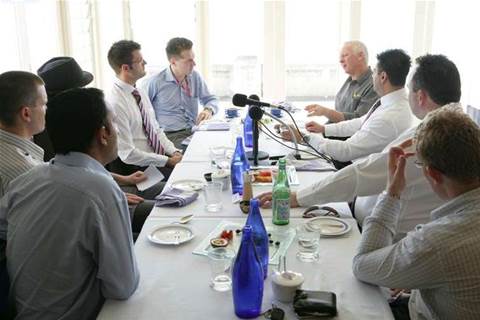CRN: Scott, from Allied's point of view, how do virtual desktops affect SMB networks?
Penno: The requirements of the network change when you move from fat clients to thinner clients. With a fat client the thing that matters is trying to move a large amount of data so the bandwidth is a challenge - the more bandwidth the quicker I can download the information.
When you're working with a virtual desktop environment or a voice environment or anything that is a multimedia-type application it's not necessarily about the bandwidth anymore because screen updates are trivial, it's about the latency. So when the user moves a mouse or speaks on the phone that almost happens instantaneously, rather than treating it like a satellite phonecall where you're sitting there waiting.CRN: Is latency a big issue? Is better bandwidth to another hidden issue SMBs don't want to pay for?
Penno: Yes, I think there are a couple of different areas that people need to look at. Latency comes in all sorts of different areas of a network. It may come within the local area network because of inadequate networking products or firewalls, but more often than not it's outside the local area network.
A classic example, when you're working with a number of remote offices is remote office A will be with service provider A, remote office B will be with service provider B, and when you look at it the traffic travels halfway across the world to get to two offices in Melbourne and Sydney. There's a large amount of latency incurred transiting between here and the US.
Hayman: I couldn't agree more with that. We get lots of issues come in on our support desks from SMBs moving staff overseas to call centres in Manila and other places. They set up remote workers out there with virtual desktops and soft phones and the backhaul links are causing problems.
SMBs have tight budgets, they're saving money on staff costs but they use a dodgy internet connection and expect to do everything over it. They're saving money by putting the staff overseas but not necessarily subscribing to an MPLS-backed point to point link with an international carrier.
They might have a nice connection in Sydney but once it hits the internet all bets are off unless it's a managed network end to end.
Penno: Scott, you made the point before that the SMB is concerned about the business tools and liquidity and all that, but they need to treat information technology as another business tool that's fundamental to what they're doing, not as a bolt-on. It needs to be at the heart at what they do. Because if they invest in it correctly and take a strategic approach to it, it will deliver them the results they're looking for out of their traditional business tools.
CRN: It sounds like there's a big need for IT resellers to be teaching business skills to their customers, because we're talking about having strategies for investing in IT or managing your information and it doesn't crop up in SMB contexts as much as it does in enterprise. I think there's an opportunity here for resellers, if they can actually consult on the business and show them how to plan things and be that strategic advisor, not just the IT advisor.
Penno: The other challenge is to get them to see the value in advising them about the strategic approach because all they're going to see is oh, you want to charge me what?
Abraham: I think that's where you have to change the perception. Perception is reality and people get what they pay for. This is where the reseller really has to step up to the mark and say okay, if I want to be a trusted advisor here I have to start behaving like one.
So at the end of the day you have to step back and say look, I totally understand your challenges but these are the key areas we specialise in that we can help you with, however it might cost you this much.
The real test comes down to whether you have a strong relationship. People will pay KPMG, Accenture, people like that, $2500-4000 a day, whatever it is, or $400,000 for a report - why aren't they paying you? Because you are a technology organisation, you're an organisation that not only just does one piece of work but can look after a whole myriad of vendors.
You are the one neck to choke, you are the single point of accountability and that's where the reseller really has to step up to the mark and say I'm going to change the way things are being done with this customer.
Obeidullah: With the advent of cloud computing and all that, it's interesting to see what's happening overseas. In the UK there are companies and service providers popping up that provide a bundled complete solution for SMB which includes, say, 10 virtual desktops, 10 mailboxes, 10,000 voice minutes, mobile handsets, everything, all for like a 1000 pounds a month and that's it.
Really taking all that complexity, worrying about who's managing what, who to call for desktop and exchange - it's all a single throat to choke and it's simple.






_(21).jpg&h=142&w=230&c=1&s=1)
.png&h=142&w=230&c=1&s=1)





.jpg&w=100&c=1&s=0)








_(1).jpg&q=95&h=298&w=480&c=1&s=1)


